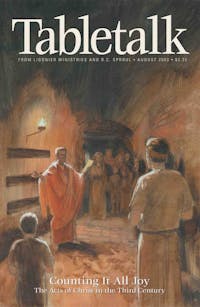
Request your free, three-month trial to Tabletalk magazine. You’ll receive the print issue monthly and gain immediate digital access to decades of archives. This trial is risk-free. No credit card required.
Try Tabletalk NowAlready receive Tabletalk magazine every month?
Verify your email address to gain unlimited access.
Nicholas of Myra’s life and ministry straddled the end of the third and the beginning of the fourth centuries. He ultimately inspired the beloved tradition of Santa Claus—and though he may not have lived at the North Pole or traveled by reindeer-drawn sleigh, he certainly was a paradigm of graciousness, generosity, and Christian charity. His great love and concern for children drew him into a crusade that ultimately resulted in protective imperial statutes that remained in place in Byzantium for more than a thousand years.
Though little is known of Nicholas’ childhood, he probably was born to wealthy parents at Patara in Lycia, a Roman province in Asia Minor. As a very young man, he became known for his piety, judiciousness, and charity, and therefore was chosen bishop of the rundown diocese of Myra. There he gained renown for his personal holiness, evangelistic zeal, and compassion.
Early Byzantine histories report that he suffered imprisonment and made a famous profession of faith during the persecution of Diocletian. He also reputedly was present at the Council of Nicea, where he forthrightly condemned the heresy of Arianism. One story holds that he actually slapped the heretic Arius for uttering his infamous abominations.
But it was his love for children that gained him his greatest renown. Though much of what we know about his work on behalf of the poor, the despised, and the rejected has likely been distorted by legend and lore, it is evident that he was a champion of the downtrodden, bestowing upon them gifts as tokens of the grace and mercy of the Gospel.
One legend tells of how a citizen of Patara lost his fortune, and being unable to raise dowries for his three young daughters, he determined to give them over to prostitution. Upon hearing of this, Nicholas took a small bag of his own gold coins and threw it through the window of the man’s house on the eve of the feast of Christ’s Nativity. The eldest girl was married with it as her dowry. He performed the same gracious service for both of the other girls on both of the succeeding nights. The three purses, portrayed in art with the saint, are thought to have been the source of the pawnbroker’s symbol of three gold coins or balls. But they also were the inspiration for Christians to begin the habit of giving gifts during each of the twelve days of Christmas.
In yet another legend, Nicholas saved several youngsters from certain death when he pulled them from a deep vat of vinegar brine—again, on the feast of the Nativity. Ever afterward, Christians remembered the day by giving one another the gift of large crisp pickles.
Through the centuries, the traditions associated with Nicholas have proven to be an inducement to steer clear of the twin pitfalls and pratfalls of materialism and asceticism. In the midst of the whirling change of the modern world, we need those traditions more than ever. Connections to the past are the only sure leads to the future. Thus, the realm of tradition is not just the concern of historians and social scientists.
Again and again that stress is evident in the Scriptures. God calls upon His people to remember: He calls on them to remember the bondage, oppression, and deliverance of Egypt; He calls on them to remember the splendor, strength, and devotion of the Davidic kingdom; He calls on them to remember the valor, forthrightness, and holiness of the prophets; He calls on them to remember the glories of creation, the devastation of the flood, the judgment of the great apostasies, the miraculous events of the Exodus, the anguish of the desert wanderings, the grief of the Babylonian exile, the responsibility of the restoration, the sanctity of the Lord’s Day, the graciousness of the commandments, and the ultimate victory of the Cross; He calls on them to remember the lives and witness of all those who have gone before in faith—forefathers, fathers, patriarchs, prophets, apostles, preachers, evangelists, martyrs, and confessors—every righteous spirit made pure in Christ.
We are enamored of progress. We are living at a time when things shiny and new are prized far above things old and time-worn. But many of the wisest of men and women through the ages have recognized that tradition is a foundation upon which all true advancement must be built—that it is, in fact, the prerequisite to all genuine progress. We must never allow temporary expediencies to supersede permanent exigencies.
Modern marketers and commercial concerns may very well abuse traditions such as those that revolve around the character of Nicholas of Myra. But they can also be powerful inducements to remember the things that matter most. They can be the means by which beauty, goodness, and truth come to prevail in our homes, our communities, and our land—just as surely in the month of August as in December.
